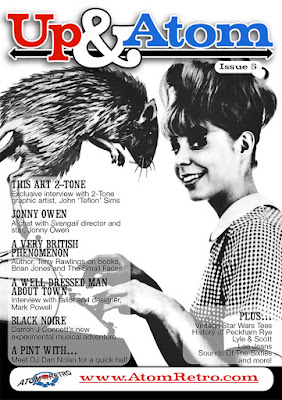 |
| Terry Rawlings at Decca Records, 1980 |
Through his vast knowledge of music from both working within the industry and as a fan, author Terry Rawlings has created works worthy of any music connoisseurs collection. His impeccably researched Mod: A Very British Phenomenon and Brian Jones: Who Killed Christopher Robin? are staple books in many a household and he has earned a reputation as an authoritative figure within the mod scene. Gibson London’s Simon Parr invited Terry to his London Showroom and this is what he had to say:
Simon Parr: How did you first become a writer?
Terry Rawlings: I was expelled from school in the 5th year for doing graffiti on the walls outside the school gates. The school was at Dockhead, and we were right on the docks. I got the white liner that was used to mark out the pitches and I wrote all along the back where the docks were, ‘Mr Shields is a c***’. My friend was up a wall, painting over a lot of graffiti and I thought I can’t let him take the blame for it so I stupidly owned up. After I was expelled, I didn’t really have a career or anything in mind until I got a job in the post room at Decca Records, which [DJ and presenter] Gary Crowley got me. I just sort of replaced him. He left on the Friday and I started on the Monday. It was sort of like-for-like because we both dressed the same and the studio manager just thought it was one parka for another. From Decca Records I went onto Sire Records, where we were doing this Small Faces fanzine. Paul Weller liked the fanzine and it was Paul who opened the door for me to start writing. Paul Weller, after getting our fanzine, started one of his own up called Decembers Child and I did some bits and pieces for that, and it was him who suggested I should write a book.
SP: And that was All Our Yesterdays? The Small Faces Book?
TR: Yes. I was working for Sire Records (Home of The Ramones and The Pretenders) and me and a friend of mine, Tony Lordon - he was the bass player in Department S (of Is Vic There? fame) - we used to do a fanzine called Sha La La La Lee (not very imaginative, I know!) about The Small Faces. Back then, we’re talking about 1980, The Small Faces had been totally forgotten, nobody knew about them; the profile they’ve got now wouldn’t have been dreamed of back then. The only album you could get was on Charly Records, anything else you couldn’t get hold of. Paul Weller had got into The Small Faces. He was a big fan of The Kinks and The Who, and he got into The Small Faces too.
We used to do the fanzine on the photocopier in the Sire Records office and Paul would come and get it. We’d done about three issues and then he suggested the idea to do a bigger version of it, like a pamphlet or a mini- book thing, which we called All Our Yesterdays. I’d found all these photographs that hadn’t been seen back then. Nobody cared about them. They had reformed once and no one cared. The band had 3 of the Small Faces in it and they’d been playing pubs.
SP: That was minus Ronnie Lane wasn’t it?
TR: Yeah, he came back for about a day and then they had a bit of a punch up and he left again, so Rick Wills from Foreigner, who’s in Kenny Jones’ band now, joined instead. But they couldn’t get arrested, you know? They didn’t look like The Small Faces, to be honest, they looked like Smokie, you know, all weird.
So, Paul came up with the idea of doing a better version of the fanzine and that was my first attempt at writing something. We did this little pamphlet thing that he got printed up, and they sold them on The Jam’s merchandising stall at the gigs. We re-printed it a few times. It started to turn people onto The Small Faces. It reminded people [of them]. I never big myself up about it but it was the only thing you could get then on The Small Faces and it caught people’s imaginations. People only knew about The Who and The Kinks, in that ’79 Mod Revival, and they didn’t know about The Small Faces. It started a little Small Faces revival, I’m pretty sure, and look at where it is now. I don’t even have a copy of the book anymore, which is quite sad. It wasn’t a great literary advancement on my part, but after that Paul suggested I do another book, a serious book, and that turned out to be twenty years of researching the Brian Jones murder. So it was down to what Paul said and his help that got me going, so I owe it all to him.
SP: That became Who Killed Christopher Robin: The Truth Behind The Killing Of Brian Jones, about the life and death of Brian Jones from The Rolling Stones.
TR: When I worked at Decca, it seemed everybody had been there since the 1960s and they all had a story about Brian Jones and speculated on his death. The edition that is out now is the third edition. We had to do a second edition when we realised how many mistakes we’d made in the first, after we got new information, new police files, new home office files and more interviews. We’d realised we’d made so many glaring mistakes in the first one we had to do a second one just to put it all right. So we had about 80% of the story put right in the second edition, but there were still massive areas where we weren’t sure of things.
Then I got ill and I was out of the game for about a year when I had cancer and in the meantime I heard a guy had beat me to the new police files which had been released after forty years. Paul Spendel was going to do a book and he was asking me for help. I said, ‘Listen, it’s only right that I’ve done this much work and you’ve just jumped in at the last minute and got the last files because I was ill, why don’t you join me and we’ll put out a third edition - that is the ultimate edition - and we’ll share the grief and the glory, so to speak?’ He was a nice fella and he was up for doing it, so it made sense to collaborate.







